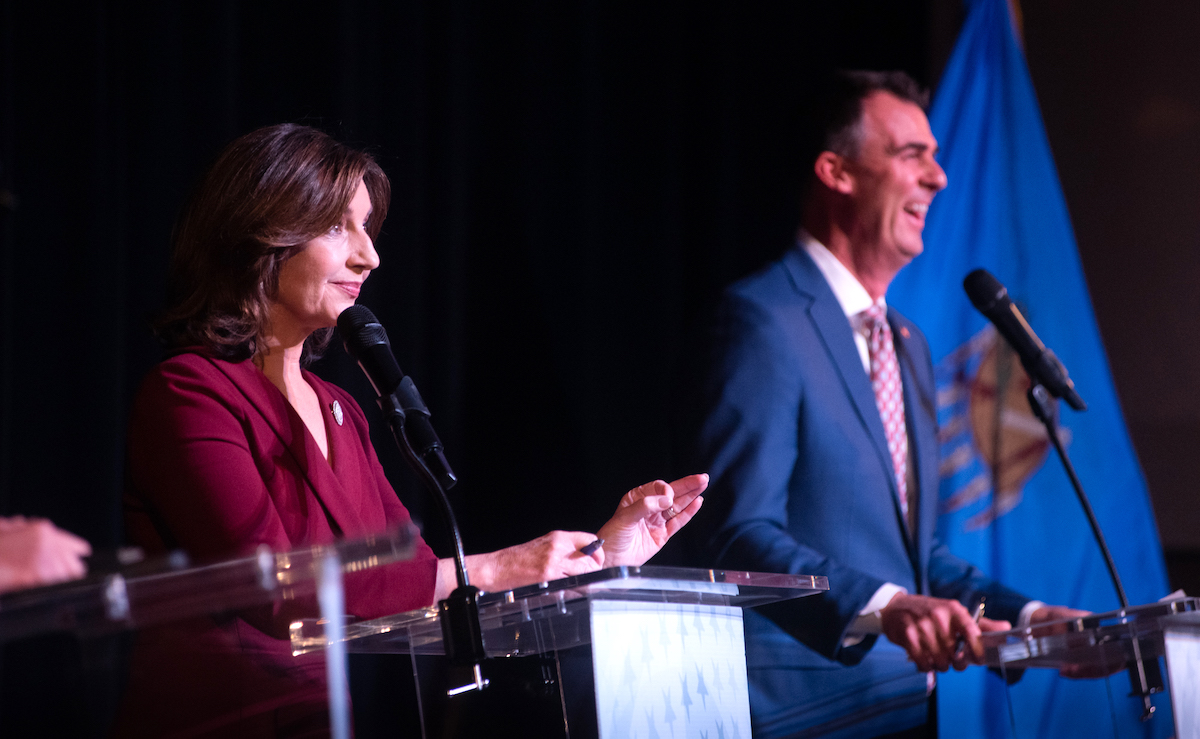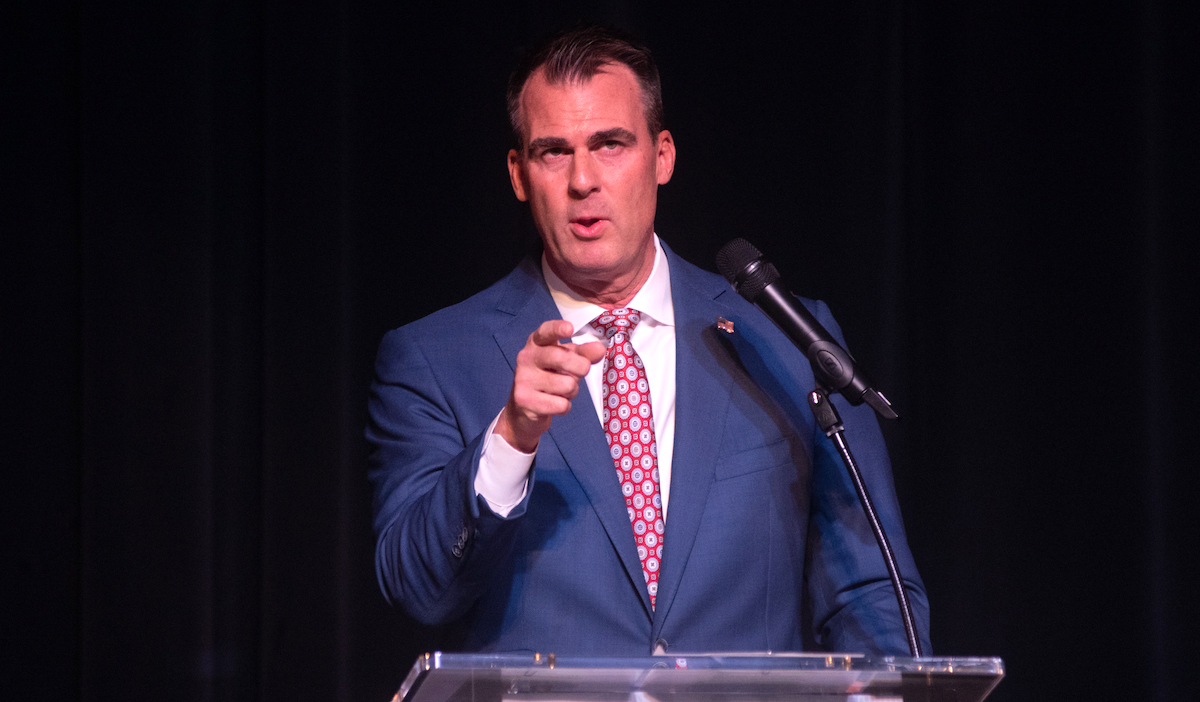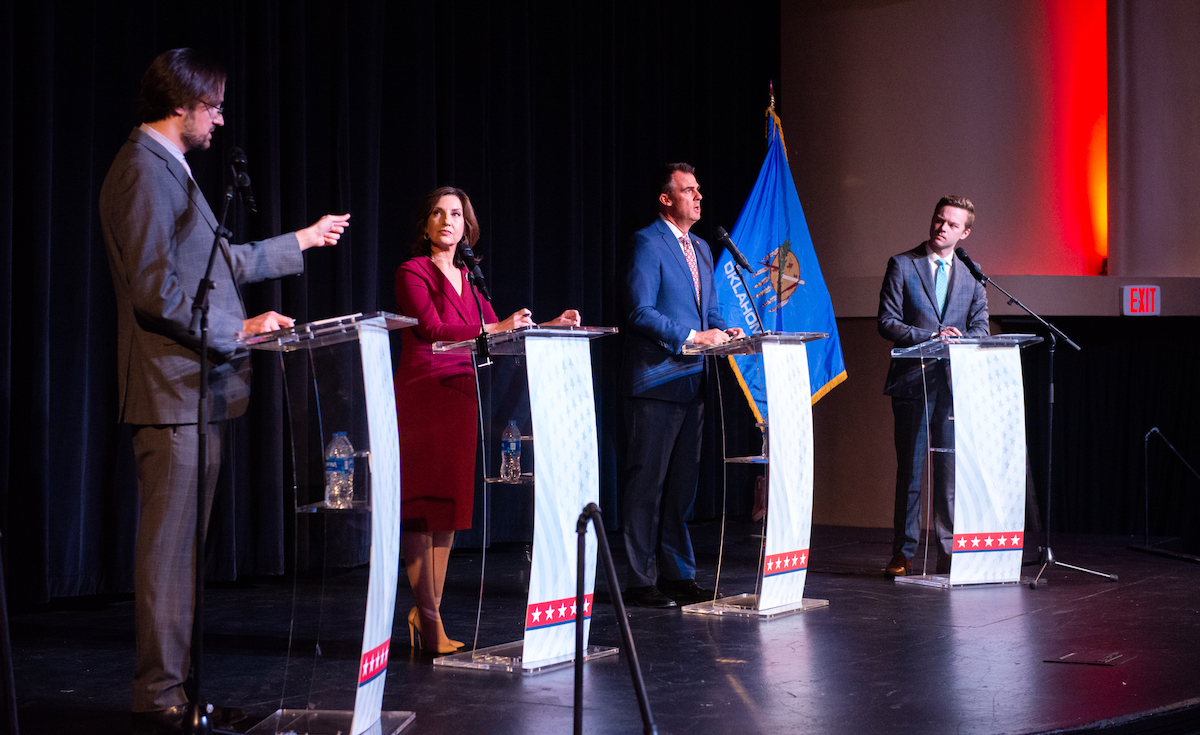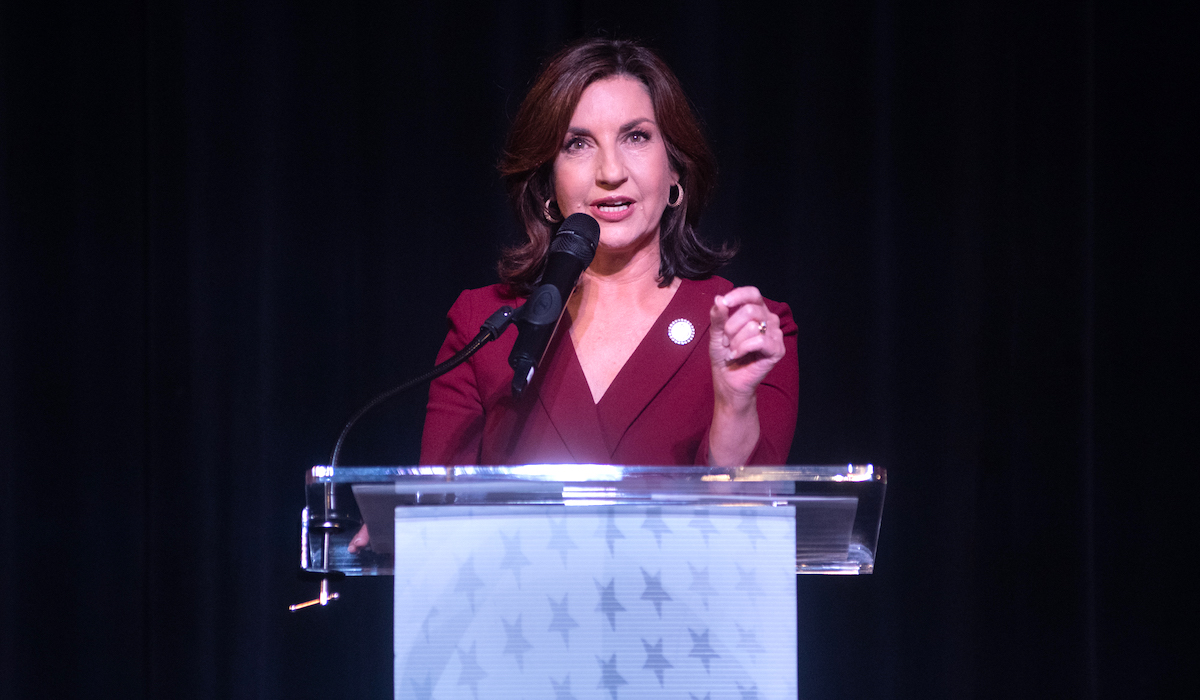
Oklahoma Gov. Kevin Stitt tried to tie his opponent to Democratic President Joe Biden and a far-left policy agenda, while challenger Joy Hofmeister peppered the incumbent governor with quips about scandals and criticism of his strained relationship with tribal nations during a 90-minute debate Wednesday night at Will Rogers Theatre.
The pair are locked in a close race three weeks ahead of Oklahoma’s Nov. 8 general election, with one recent poll showing Hofmeister and Stitt virtually tied and another giving Hofmeister a 7 point lead.
Early in the debate — hosted by NonDoc and News 9 with the State Chamber of Oklahoma serving as presenting sponsor — Stitt was asked about his often-referenced quest to make Oklahoma a top-10 state, and he responded with a revelation that some considered to be a gaffe.
“As a leader and governor, whether you’re a CEO, you have to set a vision for all of your employees and for all of the state,” Stitt said. “So being top 10 is an aspirational goal. It’s something that we’re never going to hit, but it directs us in that we live in the greatest state in the country. The American dream is alive and well in Oklahoma.”
Hofmeister was asked about her political about face. She was elected as state superintendent of public instruction in 2014 and 2018 as a Republican, but she switched to the Democratic Party in late 2021 to run against Stitt.
“Our governor has hijacked the Republican Party,” Hofmeister said in explaining her choice. “He is dragging our state into the ground. I am aggressively moderate, always have been. I believe in bringing people together. Not what our governor has done, which is sowing chaos and division, pitting neighbor against neighbor. We need to move forward, and there is a lot on the line.”
Stitt repeatedly referenced Biden during the debate, attempting to tie Hofmeister to a president who is broadly unpopular in Oklahoma. Hofmeister said she is not beholden to national Democrats, and she did not directly answer questions about whether she supports the Oklahoma Democratic Party platform on the topics of reducing carbon emissions and abolishing the death penalty. If elected, Hofmeister said she would forge her own path, and she took a shot at Stitt’s past status as a nonvoter in gubernatorial elections.
“I’m an independent thinker,” she said. “I’m running as an Oklahoman, and I’m on one team, and that’s ‘team Oklahoma.’ I stand here today representing Oklahoma families, regardless of their party affiliation. And I will also say that I was Republican longer than Gov. Stitt was registered to vote.”
Stitt countered Hofmeister by touting his efforts to lower taxes, and build up the state’s savings during his first term, along with his intent to eliminate the state sales tax on groceries if he is re-elected.
“We’ve been holding government accountable,” Stitt said. “We believe in small government, lower taxes. My opponent, she couldn’t see a path forward for herself as a Republican, so she switched parties. She joined Biden’s party.”
Stitt open to exceptions for abortion, Hofmeister seeks repeal of ban

Just ahead of the Dobbs v. Jackson decision by the United States Supreme Court earlier this year, Stitt signed a bill creating one of the most restrictive abortion laws in the country that bans the practice at conception.
The only exception for abortion in Oklahoma now is in the instance that a doctor deems it medically necessary to save the life of the mother. Most Americans favor women being able to access abortion services, according to recent polling. Even in deep red Oklahoma, a poll in May found 55 percent of Oklahomans oppose a total ban on abortion.
Stitt again attempted to paint Hofmeister as someone in line with national Democrats on that issue.
“We believe that life begins at conception in Oklahoma,” Stitt said. “There are exceptions in our law that we’re going to leave up to the health care professions. But I think we want to be number one in caring for the mother and the child in Oklahoma. We want to be number one in adoption rates. But I think the most extreme view here is my opponent’s and her party, and she won’t actually answer it.”
Pressed to answer the question, Stitt said he would be open to allowing exceptions for rape and incest, and for those who are entering treatment for alcohol or drug addiction.
“If the Legislature put that on my desk, I would sign that,” Stitt said.
Hofmeister said she is personally pro-life but does not support Oklahoma’s restrictive new laws following the Dobbs decision, which allowed states to pass their own laws banning abortion.
“The women of Oklahoma have heard you loud and clear,” Hofmeister said. “Let me tell you, that we have a governor who has shown no mercy for victims of rape or incest. He has signed and invited the most extreme ban on abortion in this country. I am personally pro-life, but I haven’t walked in everyone’s shoes. I don’t favor extremes on either side of this issue. This is a health care decision between a woman and her doctor, and her faith.”
Hofmeister said if she is elected, she would attempt to undo much of what Stitt signed into law.
“We need to repeal what the governor has done,” she said. “He has criminalized health care. He has criminalized standard medical care. He has assaulted women and doctors.”
Hofmeister said she would be willing to work across the aisle to make sure women in Oklahoma can access abortion services if they need them. Republicans hold supermajorities in Oklahoma’s Legislature.
“Politics is about relationships, and I have worked with many of our Republican and Democratic elected leaders in the House and Senate, and there are many who have worked to advance issues that their communities want, and we do the hard work of building consensus, of bringing people together and leading,” she said.
Stitt downplays Swadley’s controversy

The Department of Tourism and Recreation’s nearly $17 million contract with Swadley’s Foggy Bottom Kitchens to operate restaurants in six Oklahoma state parks has become one of the biggest controversies of Stitt’s administration.
According to the Legislative Office of Fiscal Transparency, Swadley’s allegedly over-billed the state as it remodeled and later operated the restaurants. The Stitt administration has sued Swadley’s over alleged violations of the contract, and the controversy forced the resignation of former Tourism Director Jerry Winchester, whom Stitt called “fantastic” during Wednesday night’s debate.
Stitt compared the scandal to a dispute with a contractor when building a home, and he said the state did not lose $17 million on the deal with Swadley’s.
“It’s like if you build a home and hire a contractor and then the contractor over charges you for sheet rock or this piece of equipment,” Stitt said. “That’s what we’re talking about here. The vendor over charged us, and there is a lawsuit against that vendor, but to say the taxpayers lost $17 million is untrue.”
Stitt said the controversy is fueled by partisan politics.
“You notice this all pops up in an election year, and it’s from my opponent who likes to kind of deceive people out there in the public,” Stitt said.
Hofmeister accused Stitt of being asleep at the wheel while millions in state dollars were misspent.
“This is a governor who has squandered, mismanaged and lost millions of taxpayer dollars on his watch, with his appointees,” she said. “Let’s just talk about those facts. The state auditor in 2021 shows $41 million in questioned costs among agencies that he has control over, $20 million in missing PPE inventory paid for and never received, $12 million lost in the Swadley’s scandal. Can’t even trust you with barbecue.”
SQ 820, medical marijuana discussed

Oklahomans will go to the polls March 7 to decide the fate of SQ 820, which would legalize recreational marijuana for those age 21 and older while also imposing a 15 percent tax on purchases and expunging some records related to past marijuana convictions. Those who are in the state’s medical marijuana program would be unaffected.
Hofmeister refused to answer whether she would support or SQ 820 if elected as governor, instead using the question as an opportunity to attack Stitt on the state’s medical marijuana program, which some believe has been problematic for rural areas of the state.
“Whether or not I support this depends on who is governor,” she said. “Because frankly, this governor, we saw the mess that was made — it’s the wild, wild west with medical marijuana. With 8,500 dispensaries, with a governor who at the same election, took the mantle of that office and failed to lead, to put those guardrails in place to contain the medical marijuana industry. We have good growers, we have bad growers. I was talking to some DEA agents in a diner on Main Street in rural Oklahoma, and I asked him, is it true that we have Russian and Chinese mafia in Oklahoma? And they said, ‘Yes.’ That’s on his watch.”
Stitt said during the debate he opposes the state question and would personally vote against it.
“No, I’m not supporting that. It is still illegal federally. We should not have a checkerboard of jurisdictions across the state, so I’m not supporting recreational marijuana,” Stitt said. “I’m not sure, again, what my opponent is saying. She’s been spinning this in a circle like a politician, but I think Oklahomans want to know what her answer is on this issue.”
Stitt defended his record on medical marijuana, adding he was saddled with what he said was a poorly worded question in SQ 788 that was passed in 2018, months before he was elected governor.
“When I first became governor, it was a poorly worded referendum and this industry popped up overnight — medical marijuana industry,” he said. “So we passed, I think, 12 different laws last year to address it. We spun the agency out, we hired 80 new enforcement agents. We have a moratorium (on new commercial licenses). So I heard from rural Oklahoma with all the foreign nationals buying up farm land and ranch land. We put a moratorium. There’s no more new licenses until we get control of this industry. We also are one of only 14 states that we passed, it’s illegal for a foreign national to own farmland in Oklahoma. So we’re doing drug busts, we’re enforcing that.”
Both candidates were asked whether they had ever used marijuana during their lives. Hofmeister said she had not, while Stitt said that he had.
Hofmeister takes aim at Stitt on McGirt

Candidates were asked about the landmark McGirt vs. Oklahoma decision by the U.S. Supreme Court in July 2020. The ruling affirmed the Muscogee Nation as an Indian Country reservation. Subsequent decisions from the Oklahoma Court of Criminal Appeals said the federal court ruling also applies to the Cherokee, Choctaw, Chickasaw, Seminole and Quapaw nations. that meant only a tribe and the federal government — not the state — have criminal jurisdiction over major crimes that occur on reservation land involving tribal members. (A subsequent decision in Oklahoma v. Castro-Huerta granted the state concurrent jurisdiction to prosecute crimes committed against tribal citizens.)
Stitt has maintained that the McGirt decision specifies that it only applies to criminal jurisdiction, while some tribal leaders have articulated that they believe that is applies to civil law as well. For that reason the tribes and Stitt have been at odds, including a tumultuous public forum after the decision was handed down.
Hofmeister again attacked Stitt, this time over his handling of the McGirt fallout.
“We are in a mess of the governor’s making with McGirt,” Hofmeister said. “Obviously, the ruling came, and we saw a governor who did not work immediately to secure those communities all across those six affected tribes and work together to establish a compact that would address cross jurisdiction or cross-deputization, where we can ensure that we are keeping everyone safe in these criminal matter. Instead, what this governor has done is what he does with a lot of things — he is sowing chaos and division, and that division is pitting neighbor against neighbor.”
Hofmeister, who has been endorsed by the leaders of the Five Tribes, said refused to answer whether she believes the McGirt decision affects civil jurisdiction on matters such as surface mining regulation and taxation.
“That is a matter that is going to require us to work together, and we know it’s being litigated right now,” she said. “No, that’s not a ‘Yes’ or ‘No’ answer, because these are different tribes that all have a different view on this. You, collectively, lump people together. That is not the kind of leader that understands that we have 39 unique sovereign tribal nations in this state and they don’t speak with one voice. In fact, the historic moment was when they stood up and said, ‘You must go.’”
Stitt said the topic offers voters a clear a contrast between himself and Hofmeister, in that he does not believe eastern Oklahoma should be “federalized,” which is what he said the McGirt ruling did.
“This is great for everybody out there watching on TV, because this is a clear difference between me and my opponent,” he said. “The McGirt decision was a federalization of all of eastern Oklahoma. Basically, the Biden administration is now in charge of eastern Oklahoma. That’s what that was. And we’re for fairness, we’re for equal protection under the law. I don’t believe because of race or heritage you should have different punishments. We should all be Oklahomans, in other words. And right now, the answer is very clear, absolutely not, it shouldn’t go into civil (jurisdiction) or taxation.”
Hofmeister said it is important for Oklahoma’s chief executive to respect tribal sovereignty.
“We have to be able to have a governor who understands and respects the tribal sovereignty of the 39 sovereign nations in this state,” she said. “We do not have that, and you heard it with this answer. And the second thing is, we have to do the hard work. There can be a ‘win, win,’ but it takes work. With Gov. Stitt, there’s always a loser.”
Stitt was pressed on whether he recognizes in tribal sovereignty, but his answer drew some laughter from the audience.
“Absolutely, yes,” Stitt said. “They have sovereignty over what they have sovereignty over. It’s a confusing question for all of us.”
Stitt disputed the concerns of tribal leaders that he is unwilling to sit down with them to work through differences on the reservation jurisdiction question. When asked when he would next sit down with tribal leaders to repair their relationship, Stitt suggested the next day at 10 a.m.
“At the State Capitol, right in the conference room,” Stitt said. “The fact that people say that we’re not willing to talk is simply untrue.”
Following the debate, Choctaw Nation Chief Gary Batton issued a statement urging tribal citizens to vote for Hofmeister, and Cherokee Nation Principal Chief Chuck Hoskin Jr. tweeted that “there has been no invitation to meet with Gov. Stitt.”
During the final round of the debate, Stitt criticized Hofmeister for being supported by up to $20 million in Super PAC and dark money independent expenditures.
“I think it’s a question we all want to know and I know people at home want to know, who’s behind all these dark money ads? Twenty million dollars has been spent against me, attacking me, spreading lies and chaos and misinformation, supporting my opponent. I’ll give you 20 million reasons why she will be beholden to special interests and not you, the people,” Stitt said. “I would like my opponent to tell us who it is. We both know she knows who it is. We would like her tell us who it is. The people deserve it. The people want to know, Joy.”
Hofmeister responded to Stitt by saying, “No, actually you are wrong.”
“If there is a way to get money out of politics, sign me up. Because it is what has corrupted this state. Eight out of 10 Oklahomans believe there is corruption and state government on your watch. And they are saying that they see your self dealing,” Hofmeister said. “They see your cronyism, and I’ve had a front row seat to the corruption that I’ve witnessed under your watch. Oklahomans are sick of it. They want our state to move forward in a way where we put people first. We don’t read off a national script like this governor. Instead we put people first and that we are careful with their precious taxpayer dollars.”




















